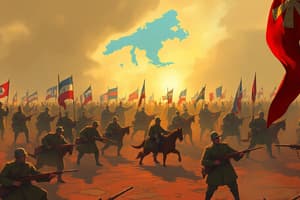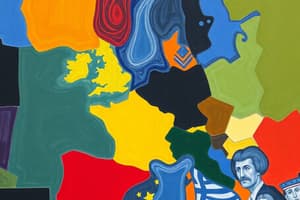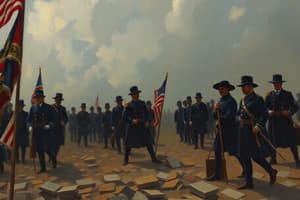Podcast
Questions and Answers
What is Nationalism?
What is Nationalism?
A deep devotion to one's own nation
What was the Triple Entente?
What was the Triple Entente?
Britain's alliance with France and Russia established in 1907
What was the Triple Alliance?
What was the Triple Alliance?
Alliance between Germany, Austria-Hungary and Italy whose goal was to isolate France
What is Militarism?
What is Militarism?
What was the Schlieffen Plan?
What was the Schlieffen Plan?
What was the Western Front?
What was the Western Front?
What is the Eastern Front?
What is the Eastern Front?
What is Rationing?
What is Rationing?
What is Propaganda?
What is Propaganda?
What is Total War?
What is Total War?
What is Self-Determination?
What is Self-Determination?
What were the Fourteen Points?
What were the Fourteen Points?
What was the Treaty of Versailles?
What was the Treaty of Versailles?
What major event took place on June 28th, 1914 in Sarajevo, Bosnia?
What major event took place on June 28th, 1914 in Sarajevo, Bosnia?
What were several new military technologies used for the first time during WWI?
What were several new military technologies used for the first time during WWI?
How did the Allied reinforcements reach the front during the 1st Battle of the Marne?
How did the Allied reinforcements reach the front during the 1st Battle of the Marne?
What is the area between two enemy trenches called?
What is the area between two enemy trenches called?
What war supplies did the Russians lack as a result of their tendency to be under-industrialized?
What war supplies did the Russians lack as a result of their tendency to be under-industrialized?
When did Germany officially declare war on Russia and France leading up to WWI?
When did Germany officially declare war on Russia and France leading up to WWI?
What was Russia's main advantage during WWI?
What was Russia's main advantage during WWI?
How many Russian soldiers had been either wounded or killed during WWI by the mid-1917's?
How many Russian soldiers had been either wounded or killed during WWI by the mid-1917's?
What was the estimated financial cost of WWI on Europe?
What was the estimated financial cost of WWI on Europe?
How many soldiers died altogether during the course of WWI, and how many were injured?
How many soldiers died altogether during the course of WWI, and how many were injured?
Who were the first three members of the Central Powers to surrender to the Allied forces?
Who were the first three members of the Central Powers to surrender to the Allied forces?
Who was the last country to surrender?
Who was the last country to surrender?
When did WWI officially end?
When did WWI officially end?
What was the purpose of the Zimmerman note?
What was the purpose of the Zimmerman note?
What did Vladimir Lenin sign to get Russia out of WWI?
What did Vladimir Lenin sign to get Russia out of WWI?
What is an Armistice?
What is an Armistice?
What was the name of the ship sunk by German U-boats that caused the U.S. to threaten action?
What was the name of the ship sunk by German U-boats that caused the U.S. to threaten action?
Who were the members of the 'big four' at the peace conference following WWI?
Who were the members of the 'big four' at the peace conference following WWI?
Which nation faced the harshest punishments as a result of the War Guilt Clause?
Which nation faced the harshest punishments as a result of the War Guilt Clause?
What was the goal of the League of Nations?
What was the goal of the League of Nations?
Which major world power failed to join the League of Nations?
Which major world power failed to join the League of Nations?
Following the end of WWI, which new countries were created?
Following the end of WWI, which new countries were created?
Flashcards
Nationalism
Nationalism
Strong pride in one's nation, often leading to competition and conflict.
Triple Entente
Triple Entente
Alliance between Britain, France, and Russia in 1907.
Triple Alliance
Triple Alliance
Alliance between Germany, Austria-Hungary, and Italy.
Militarism
Militarism
Signup and view all the flashcards
Schlieffen Plan
Schlieffen Plan
Signup and view all the flashcards
Western Front
Western Front
Signup and view all the flashcards
Eastern Front
Eastern Front
Signup and view all the flashcards
Rationing
Rationing
Signup and view all the flashcards
Propaganda
Propaganda
Signup and view all the flashcards
Total War
Total War
Signup and view all the flashcards
Self-Determination
Self-Determination
Signup and view all the flashcards
Fourteen Points
Fourteen Points
Signup and view all the flashcards
Treaty of Versailles
Treaty of Versailles
Signup and view all the flashcards
Assassination of Archduke Franz Ferdinand
Assassination of Archduke Franz Ferdinand
Signup and view all the flashcards
Military Technologies
Military Technologies
Signup and view all the flashcards
No Man's Land
No Man's Land
Signup and view all the flashcards
Allied Reinforcements at Marne
Allied Reinforcements at Marne
Signup and view all the flashcards
Russian Soldier Shortages
Russian Soldier Shortages
Signup and view all the flashcards
Casualties (WWI)
Casualties (WWI)
Signup and view all the flashcards
Financial Cost (WWI)
Financial Cost (WWI)
Signup and view all the flashcards
Central Powers Surrender
Central Powers Surrender
Signup and view all the flashcards
End of WWI
End of WWI
Signup and view all the flashcards
Zimmermann Note
Zimmermann Note
Signup and view all the flashcards
Treaty of Brest-Litovsk
Treaty of Brest-Litovsk
Signup and view all the flashcards
Armistice
Armistice
Signup and view all the flashcards
Lusitania
Lusitania
Signup and view all the flashcards
League of Nations
League of Nations
Signup and view all the flashcards
New Nations
New Nations
Signup and view all the flashcards
War Guilt Clause
War Guilt Clause
Signup and view all the flashcards
Study Notes
Key Terms and Definitions
- Nationalism: Significant pride in one’s nation; a catalyst for competition and conflict.
- Triple Entente: An alliance formed in 1907 between Britain, France, and Russia.
- Triple Alliance: Alliance between Germany, Austria-Hungary, and Italy aimed at isolating France.
- Militarism: A strategic focus on enhancing military might and readiness for conflict.
- The Schlieffen Plan: Germany's strategy in WWI to quickly defeat France before turning east to Russia.
Major Battles and Fronts
- The Western Front: A critical and heavily contested area in Northern France during WWI.
- The Eastern Front: The battlefield located along the German-Russian border.
War Efforts and Strategies
- Rationing: Implementation of limits on goods available to civilians during wartime.
- Propaganda: Biased information used to influence public opinion and morale toward the war effort.
- Total War: The concept of mobilizing all national resources for warfare.
Political Concepts
- Self-Determination: The principle that nations have the right to choose their own government.
- Fourteen Points: Proposed by Woodrow Wilson to establish a framework for lasting peace in Europe.
Peace Treaties and Agreements
- The Treaty of Versailles: A pivotal agreement to maintain peace post-WWI and impose penalties on Germany.
Notable Events and Consequences
- Assassination of Archduke Franz Ferdinand: Occurred on June 28, 1914, sparking the beginning of WWI.
- Military Technologies in WWI: Introduction of advanced weaponry, including machine guns, poison gas, and tanks.
- No Man's Land: The dangerous territory between opposing trenches.
Military Engagements
- Allied Reinforcements at the Marne: Reached the front lines using taxi cabs for quick transport.
- Russian Soldier Shortages: Affected by under-industrialization, leading to shortages of critical supplies.
Casualties and Economic Impact
- Casualties: Approximately 5.5 million Russians lost due to war by mid-1917; a total of 8.5 million soldiers died and 21 million were injured overall.
- Financial Cost: Estimated war damage across Europe was about $338 billion.
Key Surrenders and End of War
- Central Powers Surrender: Germany, Austria-Hungary, and Italy surrendered before Bulgaria and the Ottomans.
- End of WWI: Officially concluded on November 11, 1918.
Significant Diplomatic Moves
- Zimmerman Note: Germany encouraged Mexico to join the war against the U.S. with promises of territorial recovery.
- Treaty of Brest-Litovsk: Signed by Lenin, it marked an agreement of truce between Russia and Germany.
Agreements and Organizations Post-War
- Armistice: A formal cessation of hostilities.
- Lusitania: Sinking of this ship by German U-boats escalated tensions with the U.S.
- The League of Nations: Intended to facilitate peaceful resolution of disputes, but the U.S. did not join.
- New Nations: Post-WWI independence recognized for Austria, Hungary, Czechoslovakia, and Yugoslavia.
Post-War Punishments
- War Guilt Clause: Imposed severe penalties on Germany following the war.
Studying That Suits You
Use AI to generate personalized quizzes and flashcards to suit your learning preferences.




